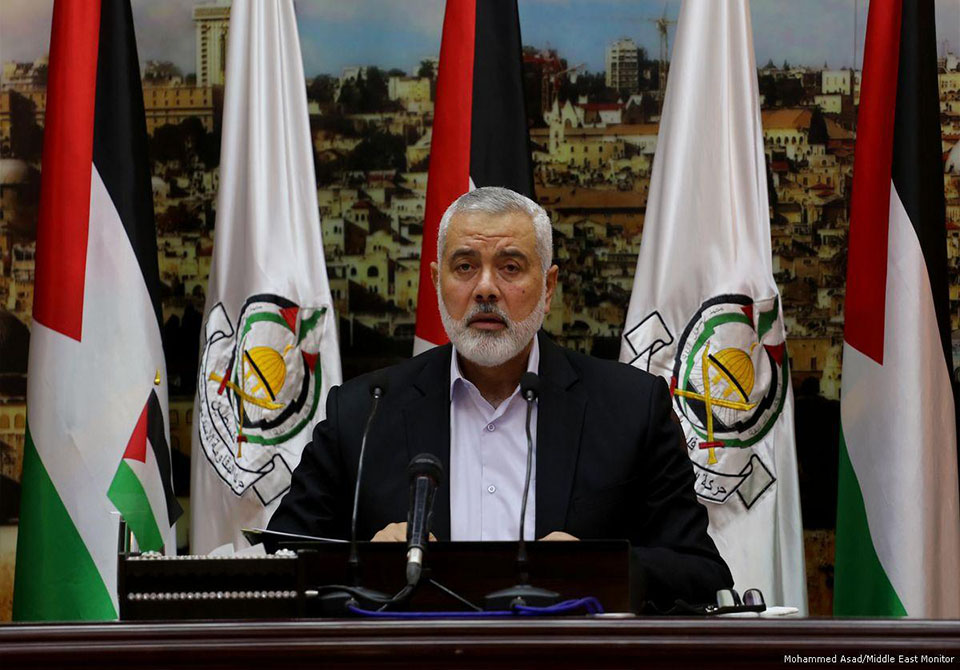Hamas, Moscow and the implications of Haniyeh’s visit

0 SHARES The Russian Foreign Ministry has rejected objections from its Israeli counterpart about the upcoming visit of the head of the Hamas political bureau to Moscow. According to Israel’s Channel 10
The Russians responded to the Israeli protest about Ismail Haniyeh’s trip by pointing out that the government of Benjamin Netanyahu is itself engaged in talks with Hamas with the aim of easing the siege of Gaza and agreeing on a truce.
Russia was among those countries, China included, which voted against the recent US draft resolution at the UN General Assembly condemning Hamas and other Palestinian resistance groups as ”terrorists”. The resolution failed to get the required two-thirds majority for it to be adopted.
It is reasonable to suggest, therefore, that Hamas is now established and recognised as a political and legal reality that can no longer be disregarded. Moscow, remember, has hosted Hamas officials before, although this is the first of its kind in terms of the level of representation and the implications of the visit of a political resistance icon so soon after that landmark UN vote. This reflects Moscow’s desire to break the US monopoly on involvement in the Palestinian portfolio.
Indeed, Russia’s political approach to the Palestinian issue is not limited to dealing with Hamas; it has tried to play a role in forging a reconciliation agreement between Hamas and Fatah. It is also trying to be an effective player in the Israeli-occupied West Bank by discussing the future of the Palestinian Authority in Ramallah; a week or so ago, Moscow hosted former Fatah official Mohammed Dahlan and gave him the space and opportunity to state his position in the mainstream media.

Furthermore, it has been leaked that there are plans for a meeting in Moscow between Dahlan and Israeli Culture Minister Miri Regev to discuss the future of the PA. This is a matter that the minister has kept quiet for fear of angering Washington, although it is unlikely that the US administration is unaware of the proposed meeting and its purpose. It is worth noting that the right-wing Regev met Dahlan in the UAE during her visit to Abu Dhabi as the head of an Israeli delegation taking part in a judo championship.
The Russian move to hold a meeting between Dahlan and Regev is symbolic and will provoke Washington, which believes it still has a monopoly over the Palestinian issue. The Trump administration is seeking to crown this with its faltering “deal of the century”.
Haniyeh’s visit to Moscow is an important breakthrough for the Russians and Hamas. The movement has now to be regarded as a major political actor, a status achieved through its political and resistance record, as well as the shifting regional and international environment.
Hamas is keen to establish its political presence and wants to send a strong message, not only to Israel but also those in the Arab world engaged in normalisation with the Zionist state. Meanwhile, Moscow is interested in taming Israel and sending its own message to the United States, and this has provided the space for wider political manoeuvres by Hamas and the other resistance groups.
Moscow is clearly making one regional breakthrough after another: a Russian military aircraft took Sudan’s President Omar Al-Bashir to Damascus recently; it is supporting, albeit indirectly, the Turkish operation east of the Euphrates; and now the visit by the Hamas leader Ismail Haniyeh. Vladimir Putin’s government is letting Washington know that it is capable of expanding its political involvement in the Middle East. This will probably push the US to take similar steps that are likely to open the door to further political transformations in the region, as well as in America’s domestic politics.
This article first appeared in Arabic on Arabi21, 20 December 2018
Source: Middle East Monitor

WRITE YOUR COMMENT